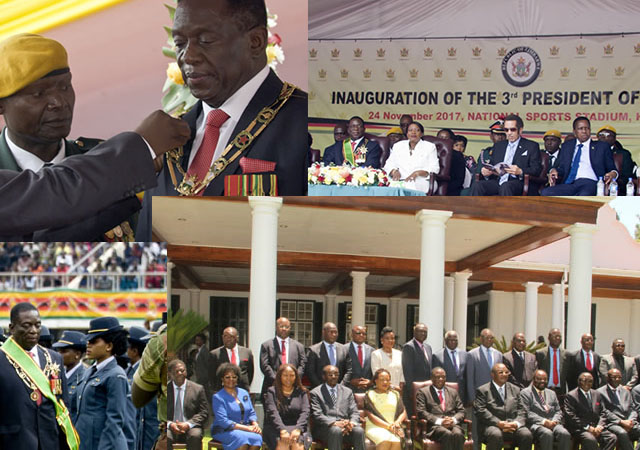 Sue Onslow explores why rejoining the Commonwealth is an attractive proposition for Zimbabwe’s new President [photos from the President's office]
Sue Onslow explores why rejoining the Commonwealth is an attractive proposition for Zimbabwe’s new President [photos from the President's office]
Rejoining the Commonwealth has been a key element of the mood music of Zimbabwe’s foreign policy of ‘robust reengagement’ with the international community under President Emmerson Mnangagwa. At first glance, this seems something of a diversion from the pressing domestic issues facing the new ZANU-PF leadership. International commentators were quick to point out last November that the parlous state of the Zimbabwean economy demanded massive foreign direct investment and emergency lines of credit to address multi-lateral debt, as well as re-engagement with the Lima Process. Furthermore, there were issues of rampant corruption, the acute cash shortage, woefully depleted public services, and pressing need for reform in the public sector where civil service salaries consume nearly 90 per cent of state expenditure. Yet, signs of Zimbabwe’s reengagement rapidly gathered momentum. In a statement in the House of Commons on 20 November 2017, UK Foreign Secretary Boris Johnson ‘backed [Zimbabwe’s] “fine and noble aspiration” [of re-joining the Commonwealth], but stressed the African nation had much to do to restore its international reputation before it could be welcomed back.’ Scarcely a week later, following on from the then UK Minister for Africa Rory Stewart’s lightening visit to Harare to meet newly-inaugurated President Mnangagwa, the Times of London reported Zimbabwe had opened talks with the UK about ‘rejoining the Commonwealth’.
Intrigued by this seeming unlikely alignment of British foreign policy with the ‘new dispensation’ in Zimbabwe, I visited Harare in mid-January to investigate the level of interest in this issue, and to ask why was renewed membership of this financially-straitened ‘club’, whose relevance is publicly questioned in the British media, deemed such an attractive proposition? Surely Chinese and other foreign direct investment was of much greater importance?
The responses surprised me, as did the uniformly positive emphasis that I had arrived at an opportune and appropriate time to ask these questions. Views among ordinary Zimbabweans in Harare ranged from the generic – a wish for access to Commonwealth scholarships and the associated chance to establish lasting professional networks established through student experience at UK universities, participation in the Commonwealth Games, memories of Commonwealth teachers and pen friends (representing being part of a wider world, than Zimbabwe’s current isolated position) – to the specific, most notably a profound hope that the current restrictive UK’s visa regime would be more sympathetic to Zimbabwean visitors if the country was back in the Commonwealth. I also encountered a hope that ‘robust engagement’ with the Commonwealth could offset Chinese business penetration of Zimbabwean markets by widening the pool of possible foreign investors, as well as boosting Zimbabwean confidence to drive a harder bargain with their Chinese business interlocutors. There was an associated hope that Commonwealth reengagement would accelerate the removal of US sanctions and the few remaining EU measures, which are still deemed to taint the Zimbabwean business environment.
At an elite political and civil society level, attitudes were decidedly mixed. I was warned of a discernible undertow of enduring resentment towards the Commonwealth among what might be termed the ZANU-PF ‘hard core’; however, that there was also an emerging dominant view that reengagement with the Commonwealth would be a much needed and rapid foreign policy success. I encountered an edge of outright impatience – a product of a brisk, goal-driven military mindset among the new Foreign Minister SB Moyo and his special advisers – and friction with the more cautious bureaucratic attitude of career diplomats within the Department of Foreign Affairs, which stressed careful strategies, strict hierarchies and control of lines of communication. Among leading opposition figures, there was keen interest in the Commonwealth dimension offering a wider environment within Africa to foster change in Zimbabwean institutions, diluting any enduring sense of a colonial ‘axis’ between London and Harare. The Commonwealth was seen as typifying an African philosophy of learning from one another, therefore detoxifying Western pressure for change. Therefore, domestic sensitivities that Zimbabwe was being hauled into the dock for persistent violations or misdemeanours, would be eased by the argument of Commonwealth African countries already possessed a template for, say, security sector reform, or local government administration and engagement with wider society, which the Zimbabwean government could usefully emulate. (This viewpoint came from a leading member of the Parliamentary committee on multilateral engagement.) There was also the desire for knowledge transfers in how to handle international negotiations which, it was believed, the Commonwealth could support. In addition, the Commonwealth was seen as a potential source of practical help on land questions (harking back to the assistance the Secretariat offered in the 1990s, in collaboration with UNDP).
Overall, I repeatedly encountered the phrase describing reconnection with the Commonwealth as ‘low hanging fruit’: that the Commonwealth offered an apparent quick diplomatic success for the ZANU-PF government, regaining a kite mark of respectability in the international community, very much in keeping with Mnangagwa’s instruction to ministries to achieve discernible success within 100 days; and its varying forms of ‘soft power penetration’ and multi-layered connectivity would rapidly foster the image of a more benign new dispensation, putting a clear stamp on the post-Mugabe era.
You can read this article in full on Africa at the LSE.
Sue Onslow is a Senior Lecturer at the School of Advanced Study in the University of London and Deputy Director of the Institute of Commonwealth Studies and a member of the Round Table Editorial Board.



